Fluorescent lights on the dark continent
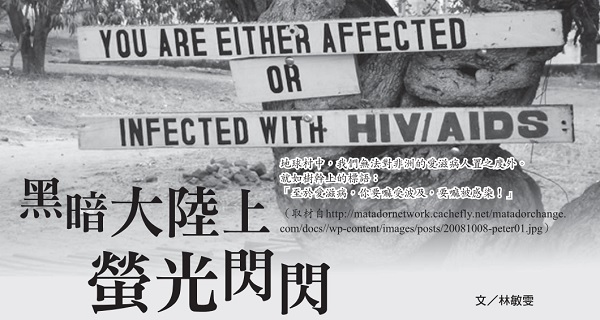
AIDS's clutches expand
根據聯合國愛滋病組織(UNAIDS)報告,撒哈拉沙漠以南的非洲愛滋病疫情發展至2007年,已有1500萬人死亡。這個僅有世界人口百分之十的地區,2007年的新增病例近乎200萬人,使得感染HIV病毒者高達2200萬人,1 患病比例高達全世界三分之二。2
How much is 22 million? It is equivalent to the population of Taiwan and nearly the entire state of New York plus the neighboring state of Connecticut. This is not just a number, it represents life. AIDS, which is still incurable so far, will cause these 22 million people to die in pain.
"Black Africa" was not only devastated by war, but poverty and disease also ravaged the survivors. The term originally referring to the skin color of the local people seems to have become an interpretation of the dark history of this land.
In the early 1980s, when AIDS was first recognized by the medical community, the clutches of AIDS spread rapidly. In just three years from 1990 to 1993, the number of people infected with HIV in Africa nearly doubled, and the number of AIDS cases increased from 650,000 to 1.7 million. 3 In Zimbabwe and Swaziland, located in south-central Africa, the HIV prevalence rate reached 26% in both 2002 and 2006. 44
A healthy human immune system is strong enough to protect against bacteria, viruses, molds, and parasites that we are exposed to in our daily lives. However, once the immune system is damaged by HIV, patients will develop symptoms such as fever, fatigue, weight loss, and diarrhea, and may develop diseases such as tumors, pneumonia, and tuberculosis. 55
The virus can be transmitted through blood, semen, vaginal secretions, and breast milk, and even to the fetus through the placenta. 66
Darkness penetrates deep and wide
However, AIDS not only destroys people's health and lives, but also robs the economic and social resources of entire countries and even the African continent.
Many countries must allocate limited hospital beds to AIDS patients and use insufficient medical staff to distribute antiretroviral treatment. 77
從出現病癥到死亡的存活時間中間值是9.2個月。8 期間患者失去工作能力,家庭收入隨之減少;家人往往節衣縮食、用罄積蓄,只為求得藥物減輕患者痛苦。如此家庭經濟由拮据至枯竭,生活陷入極度困乏。
Taking Malawi, which is suffering from food shortages, as an example, AIDS has reduced agricultural labor by 14%, reducing agricultural output. Other African countries that have been deeply affected by AIDS have also experienced a reduction in manpower, making labor here expensive, which is not conducive to business investment and threatens the foundation of economic development. 99
當雙親感染病毒,孩子便需要承擔養家及照顧的責任。父母死後,愛滋孤兒不是由親人撫養,便是成為一家之主。這些被迫提早長大、無法享有童年的孩子,只能接受幾年的教育,10 得不到其他謀生技能,脫離不了貧苦。他們也可能感染HIV而不自知,成家後將病毒再傳給配偶與孩子,繼續惡性循環。
Touch AIDS with your own hands
Pastor Li Daohong went to Rwanda for the first time five years ago and saw with his own eyes the claw marks left by the AIDS epidemic.
Hearing that the Catholic Hospital, two or three hours' drive from the village, had a department to care for end-of-life AIDS patients, Dr. Dao Hong, who specializes in anesthesia and pain, decided to visit.
The nun took the lead towards an independent cabin. The moment he opened the door and stepped in, he inhaled the strong memory of the smell, which still seems to remain in his heart.
"That's the smell of death."
The beds were neatly arranged in the dark room, and the patients were sitting or lying on the mattresses. The description of "skin and bones" turned into a horrifying reality. Flies sniff out rotten flesh and dance, which is the only dynamic feature in the entire painting.
The nuns came up to greet the patients one by one, patting their shoulders, caressing the back of their hands, or giving them a gentle hug.
"I don't understand why she wants to be so close to them?"
When Dao Hong was still wondering, he saw a man's eyelids opening slightly and his fingers moving slightly. The nun leaned close to his lips and listened to the whisper, then turned around and told:
"He asked if you could give him a hug."
The light in the room couldn't reveal Dao Hong's frozen expression, nor could it shine into his turbulent heart. The two feet between him and the patient was like the end of the world. When did the air become so heavy? Dao Hong had to use all his strength to lift a hand and place it on the man's shoulder.
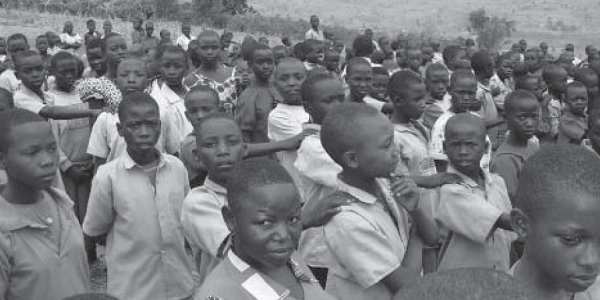
▲The Fengcheng Chinese Christian Church in the United States built a school for this village in Rwanda.
Walking in the dark land
The Chinese Christian Church in Phoenix, Arizona, USA adopts this village in Rwanda through the organization "Food for the Hungry" (www.fh.org). The short-term mission team stays for two weeks every year and jointly builds a school with a Korean church. , and hold free clinics. Brothers and sisters sponsor village children through this organization. With a monthly subsidy of US$32, these children can have food, clothing, and education.
Daohong still remembers hearing the story of David Livingstone (1813-1873)’s medical missionary work in Africa in Sunday school when he was a child. Now he also provides free clinics for villagers, conducting basic health examinations, giving over-the-counter medicines, and treating minor ailments.
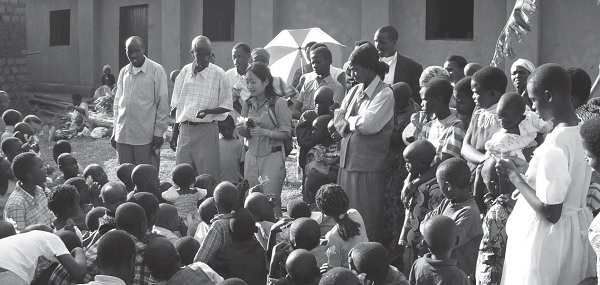
▲The Fengcheng Chinese Christian Church in the United States holds summer Bible schools in churches in adopted villages.
Because they cannot reach the nearest Catholic hospital, villagers suffering from appendicitis or pregnant women with dystocia cannot get medical treatment and can only let their lives be lost. Dao Hong was very heartbroken and suffered from the fact that he couldn't do anything.
Looking around, the war left broken families, no clean drinking water, and scarce food. Illness is like flies hovering around us, extremely annoying but lingering, and we can only learn to live with it.
If this situation can be improved through policies and foreign aid, perhaps there will be hope for this land. But all it takes is one war, one genocide, to wipe out all efforts and progress.
After returning to a comfortable and familiar environment from Rwanda, Dao Hong was full of questions.
"Did God curse Africa? Did God not love Africans? Why is God so unfair?"
Admittedly, there were no immediate answers to these questions, so he did not stop there. Instead, he began to write down and publish what he saw and heard in Africa, got to know Chinese missionaries stationed in Africa, and supported their ministries to the best of his ability. They even seized the opportunity to promote Chinese missionary organizations that came to Africa for meetings, and arranged visits to slums to hug and comfort these orphans and widows. He believes that only by personally stepping on African soil and having direct physical contact with the people can we truly understand and appreciate the pulse of the African people.
He recalled a time when he finished medical treatment in a village and it would take several hours for the pick-up car to arrive, so he decided to walk back to the monastery where he stayed. After only a few dozen minutes of walking, Dao Hong found that he was the only one wearing shoes and wearing a belt on his trousers. But instead of bringing about a sense of security, his clothes made him unique. Along the way, villagers gathered in groups of three or two, looking askance at him, or laughing and joking.
With all the nerves in his body tense, Dao Hong walked in a hostile atmosphere and realized for the first time what the apostle John said, "the Word became flesh and dwelt among us."
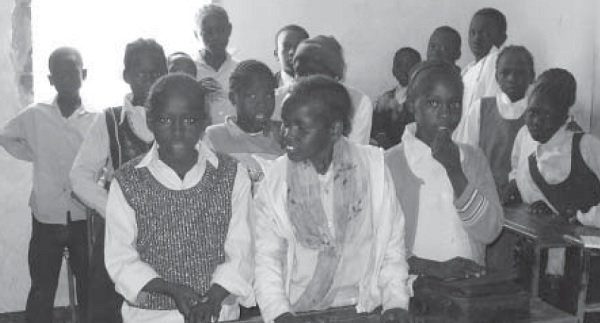
▲Teach primary school students in Sudanese refugee camps basic medical knowledge.
what the church can do
In recent years, Saddleback Church in Southern California, under the leadership of Pastor Dr. Rick Warren, has summarized six CHURCH-based ways to care for AIDS patients: 1111
*Care and comfort patients Care for and comfort the sick
*Provide inspection guidance Handle testing and counseling
*Mobilize volunteers Unleash a force of volunteers
*Restore the reputation of the church Rremove the stigma
*Promote healthy life Chealthy behavior
*Supply nutritional medicine Help with nutrition and medications
In 2005, Saddleback Church received support from Rwandan President Paul Kagame and was willing to establish the first "Purpose Driven Country". Therefore, resources were concentrated on a few villages in an attempt to bring some change to this bloody region.
For Saddleback Church, which has strong human and financial resources, such a large-scale ministry plan may be feasible; medium-sized churches can also invest tens of thousands of dollars in missionary funds to establish schools. As for small churches, and even the meager power of individual Christians, what can they do for this vast black land? What changes can it bring to the poor lives that have been lingering for generations? Can we compete with the AIDS tsunami hitting the African continent? Even if it can be done, what effect will it have?
"Saving one saves one." This is Dao Hong's final realization. Even if he can only reach one village, even if he can only sponsor one child, he must continue to do this work.
When traveling to Africa, the purpose of packing bags with daily medicines, hygiene products, books and clothing is not to improve the quality of life of the local people, but to express love and care through materials. After arriving, he ate and lived with the local people, and through sincere words, strong hugs, and gentle eyes, he became a messenger of the gospel.
Perhaps those who originally lived in despair can understand from this: In the eyes of God, no matter skin color and culture, no matter poverty, disease, wealth or strength, no matter the past or future, every life is precious and every soul has eternal value.
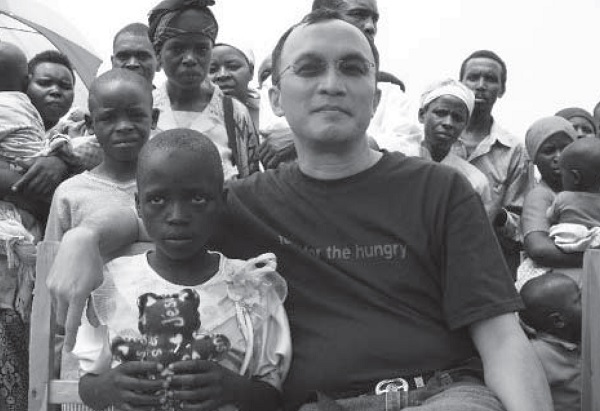
▲Pastor Li Daohong handed over a bean doll to his daughter Clarisee, an African girl she adopted.
Love is shining brightly in the dark night
The nights in Africa are dark and dense, with no street lights, neon lights, or fluorescent lights covering the land. The people there seem to be sinking into a deep cave, unable to see or touch light.
Is it really invisible and intangible?
No, when you really stop on this dark night land for a while and your eyes adjust to the environment, you can actually find: the stars are shining in the sky and the fluorescent lights are shining all around. Although it is too weak to illuminate, it can make people in darkness see and touch light.
Dao Hong's daughter also sponsored an African girl, and he wrote an article about it, "My African Granddaughter," which was published in CITIC Magazine. A few months later, the magazine editor forwarded a letter mentioning that a reader was serving time for murder in Long Island, New York. The letter said that he had never done anything to help others in his life, and he was deeply moved after reading Dao Hong's article. He decided to save money on cigarettes and pooled the efforts of other brothers in prison to collect US$32 to sponsor an African child.
Daohong conveyed the money and the reader's wishes to "Food for the Hungry", and the father of the Rwandan girl arranged for him by the organization turned out to have killed someone during ethnic conflicts.
Two strangers who were both involved in bloody violence in the past are now connected by an article. It is the good deeds inspired by the Holy Spirit that ignites the shining light of love in each other's lives and in the hearts of people from different places.
(Thanks to Pastor Li Daohong for providing the picture for this article)
Notes
1.www.unaids.org/en/CountryResponses/Regions/SubSaharanAfrica.asp
2. www.avert.org/aidsimpact.htm
3. www.avert.org/africa-aids-timelin.htm
4. Same as note 1.
5. http://zh.wikipedia.org/wiki/%E8%89%BE%E6%BB%8B%E7%97%85
6.8. Same as note 5.
7.9.10. Same as note 2.
11. "Dangerous Surrender," by Kay Warren, Messenger Publishing, 2009.
The unspeakable suffering of African women AIDS
生理的結構上女子比男子更易感染愛滋。聯合國愛滋病組織(UNAIDS)2005年的報告,撒哈拉沙漠以南的非洲,婦女罹患愛滋的比率,至少是男子的1.3倍。於15至24歲這個年齡層更高達3倍。1 2008年的報告,史瓦濟蘭的孕婦42%感染愛滋。2
In Africa, if a married wife refuses to have sex with her husband, even if the husband has AIDS and does not wear a condom, according to local culture, the husband has the right to beat her severely and expel her from the house.
Infected women, although innocent, are labeled as hybrids and are treated even more cruelly than men - beaten, fired, kicked out of their homes, humiliated, excluded from the community, and even killed. Women often avoid screening tests and delay treatment due to fear of violence, stigma and rejection.
愛滋母親若沒有接受治療,大概20-30%的嬰兒也會染上病毒。反之。若母親接受抗病毒藥物治療,寶寶被感染的危險性會減少70%,當母體的病毒量降至1,000以下,嬰兒的感染機率會降至1-2%。3 非洲感染愛滋的婦女想擁有健康的嬰兒已不是夢,況且懷孕並不會危害愛滋女性,只要接受篩檢測試與藥物治療便曙光在望。
References
1. Pregnant Women Living with HIV/AIDS: Protecting Human Rights in Programs to Prevent Mother-to-Child Transmission of HIV.
http://reproductiverights.org/sites/default/files/documents/pub_bp_HIV.pdf
2. http://www.guardian.co.uk/world/2009/feb/20/swaziland-hiv-pregnant
3. Cai Chunmei and Lourdes Association working team, "Pink News" Women's Handbook, 2007.
http://issuu.com/taiwan.lourdes/docs/____-9610
